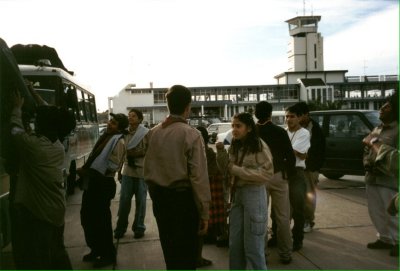Child workers in Bolivia
Tuesday, October 30th, 2007Having reported on the abandoned children last week, it reminded me of the children that I saw in Bolivia working themselves to earn extra money for their families.
Before I went to Bolivia I was given the following advice: support the children that are earning their money honestly, as it motivates them to stay out of crime or begging.
It’s certainly true that having your shoes cleaned on a street corner will not really cost you much be German standards (more probably now than then). In Sucre I don’t remember so many children working in that business, that was something I encountered more in La Paz and Cochabamba. However, there were children working as guides at the cemetery.
For a small fee, they would show you around and point out the graves of important people. In fact, they had an extensive working knowledge of the layout and history of the cemetery.
In La Paz I did, once, have my shoes cleaned by a young boy. Actually they were my hike boots and needed it after the dust of Potosí! He worked so carefully – at one stage he picked up a tin of black shoe polish and I pointed out that my boots were brown. “No”, he replied, and pointed out that the bottom rim was indeed black and he proceeded to polish this from all sides with a thinner brush.
When he was finished my boots shone and I was prepared to pay more than the going rate, well a little bit at least to show my appreciation. Anything over the top and he might have taken offence to it.
Unfortunately he didn’t want to accept my dollar coin – he wanted a dollar bill, or the equivalent in Bolivianos. In fact, he preferred Bolivianos as was working as part of a group and had to divide up his earnings with the rest.
For me it was not easy to accept a child cleaning my shoes – it is the sort of thing that you would discourage in Germany, although many years ago in the UK it is the sort of thing the Scouts would have done in Job Week.
But by the time I was in La Paz, I had visited several institutions in the country and had learnt about some of the social structures. Often, these children are allowed to go to school for half a day in return for going out to work the other half. Either they earning their school fees, or a charity will pay the school fees in return for the parents accepting this form of deal.
If the children do not earn enough, the risk is that the parents will pull out of the deal and the children will no longer be allowed to go to school. Even worse, they may end up begging on the streets or even earning their money in less legal ways.
The child that cleaned my shoes and his friends seemed very cheerful – there were no adults with them putting pressure on them. They found their customers themselves and looked after them from beginning to end. Their earnings, although fairly shared out amongst the group, were not landing in the pocket of some overseer.
If your normal image of children working is of making clothes in illegal factories in Asia or even of boys sweeping chimneys in Victorian England – then this is no comparison.
Obviously it would be better for their education to be in school full time and not worrying about the family income, but as it is this is probably a reasonable compromise.


